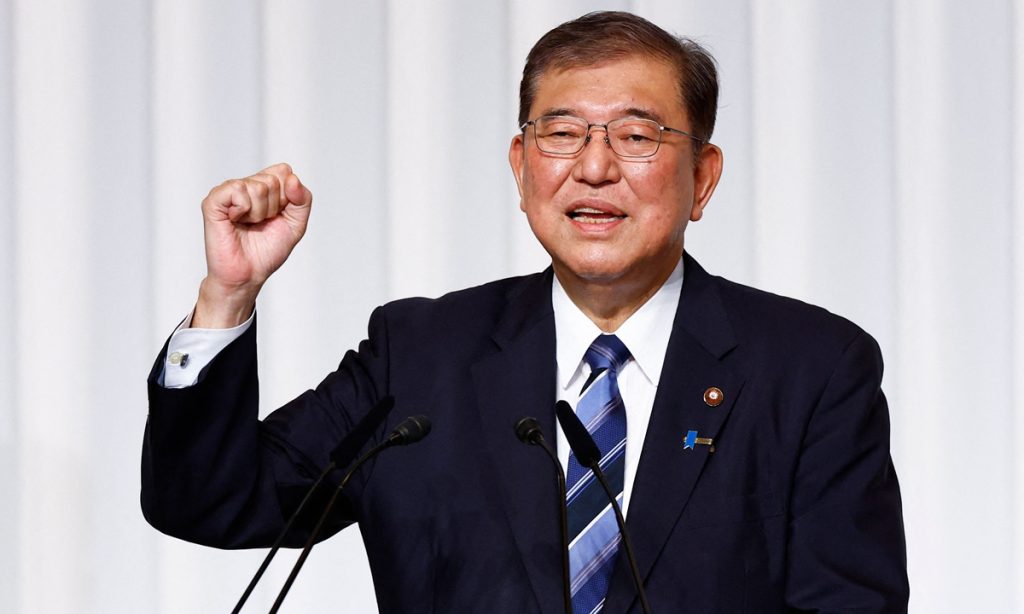Ishiba fails to secure meeting with Trump; may be 'sign of diplomatic agenda of next US admin'

Japanese Prime Minister Shigeru Ishiba reportedly didn't get meeting he sought with US president-elect Donald Trump, who though met with Argentina's President Javier Milei last week. Observers said that the cold shoulder Ishiba received may be a sign that Japan may not be marked as a priority on the diplomatic agenda of the next US administration.
Ishiba, who is on an eight-day trip for the APEC Economic Leaders' Meeting in Peru and G20 summit in Brazil, had explored the possibility of stopping in the US afterward for a meeting with Trump, Japan Today reported on Sunday.
Speaking to reporters in Lima, Peru, Ishiba said Trump's team explained that the president-elect, who has received numerous requests for meetings from world leaders, cannot hold talks with them before taking office due to legal constraints.
Japanese media quoted Ishiba as saying, "I hope to hold talks with him at the most convenient, earliest possible time for both," showing his eagerness to arrange a meeting following Trump's inauguration in January.
At a gala at Trump's Mar-a-Lago resort on Thursday, Trump however met with Milei ahead of a conservative investment summit. The Argentinean president is the first foreign leader to meet Trump since his US presidential election victory on 5 November, according to BBC.
Japanese media took note of the incident. The Asahi Shimbun described that Ishiba "suffered an embarrassing diplomatic setback" when he failed to secure an early meeting with Trump.
Ishiba's was re-elected as Japan's prime minister on November 11. However, the vote in parliament went to a runoff for the first time in 30 years when no candidate was able to muster majority support in the first round.
Observers said this shows Ishiba is a "weak leader," which Trump could see as a stark contrast to the late Shinzo Abe, reported Singapore-based media CNA.
On November 17, 2016, then Japanese Prime Minister Abe held a meeting with Trump, before the latter took office, in Trump Tower for approximately one hour and 30 minutes, according to the Ministry of Foreign Affairs of Japan. Following the meeting, Abe presented Trump a golf club and Trump presented Abe golf goods including a golf shirt.
"Trump remembers very well how sturdy, strong and trustworthy his pal Shinzo Abe was," said Tomohiko Taniguchi, a specially appointed professor at the University of Tsukuba, CNA news reported.
"Ishiba must counter the shadow of Shinzo Abe. For the moment, Donald Trump is not going to pay much attention, I'm afraid, to Ishiba," added Taniguchi, who is also a special advisor at think tank Fujitsu Future Studies Centre.
The cold shoulder Ishiba received from Trump may indicate that for the next US administration, Japan may not be marked as a priority on the diplomatic agenda, and Washington may be asking Tokyo to be more compliant and proactive in sharing the defense expenses, Lü Chao, an expert on Northeast Asia issues at the Liaoning Academy of Social Sciences, told the Global Times.
Lü said that Ishiba's recent remarks regarding the security alliance between the US and Japan, such as putting the US-Japan alliance on a more equal footing, indicate certain mood, which may have sparked discontent in Washington, suggesting an emerging rift in the longstanding alliance.
"The current Japan-US security treaty is structured so that the US is obligated to 'defend' Japan, and Japan is obligated to 'provide bases' to the US," Ishiba was quoted as saying in a statement provided to the Hudson Institute, according to the Pacific Island Times report. "The time is ripe to change this 'asymmetrical bilateral treaty'," media reported.